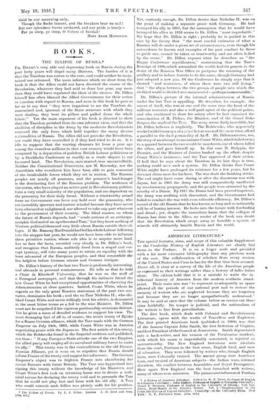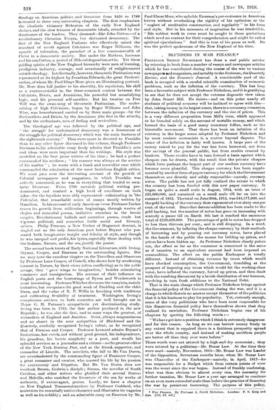AMERICAN LITERATURE.•
THE special features, aims, and scope of this valuable Supplement to the Cambridge History of English Literature are clearly laid down in the Preface. It is on a larger scale and provided with a far more extensive bibliography than any previous work of the sort. The collaboration of scholars from every section of the United States and Canada has for the first time been secured. Above all, it aims at a survey of the life of the American people as expressed in their writings rather than a history of belles leures alone. The editors hold that it is a mistake to write the in- tellectual history of America from the modern aesthetic stand- point. Their main aim was " to represent as adequately as space allowed all the periods of our national peat and to restore the memory of writers who are neglected because they are forgotten and because they are no longer sympathetically understood.' It may be said at once that the volume before us carries out thesa aims faithfully. Its temper is judicial, and the nationalism of the writers is free from parochialism.
The first book, which deals with Colonial and Revolutionary Literature, opens with the works of Travellers and Explorers. The first printed American book (published in 1608) was that of the famous Captain John Smith, the first historian of Virginia, and first President of the Council at Jamestown. Smith degenerated into a hack-writer, and his version of the Pocahontas incident, with which his name is imperishably associated, is rejected as untrustworthy. The New England historians were idealists from the start, Puritans in the best sense, English bred, and men of education. They were followed by writers who, though English born, were Colonially trained. The second group were American born, and treated of American subjects—the Indian wars, internal disorders, the conflict between Assemblies and Royal Prerogative. Here again New England was the best furnished with writers, many of whom were ministers. The paramount influence of Puritan
- - - - —
• A History of American Literature. Edited by W. P. Trent, Prcfessor of Eng:lidi in Columbia University ; John Erskine, Professes of ktsoish in Columbia thaver.11v ; Stuart P. Sherman, Professor of English in the University of Illinois ; Carl Van Doren, Head-Master of the Breariry 8,1)001. Vol. 1.—Supplementary to the cemp,iagents:urp of Enp:ish LEerattur. Cambridge : at the Enlversity Press, New, York: U. I'. Putnam's Sow. 115.. net.1 theology on American politics and literature from 1620 to 1789 Is treated in three very interesting chapters. The first emphasizes the idealistic visionary Hebraism of the early New England- divines, and the slow ferment of democratic ideals, retarded by the dominance of the leaders. They dreamed—like John Cotton—of a revolutionary Christian Utopia, but distrusted democracy. The first of the New England Puritans who effectively raised the standard of revolt against Calvinism was Roger Williams, the apostle of toleration, the preacher of a free commonwealth of Christ in a democratic society. But under the Mathers, Increase and his son Cotton, a period of illiberal dogmatism.setin. Yet these guiding spirits of the New England hierarchy were men of learning, prodigious industry, courage, and occasionally of enlightenment outside theology. Intellectually, however, theocratic Puritanism was represented at its highest by Jonathan Edwards, the great Predesti- narian, of whom Mr. Paul Elmrr More gives an illuminating portrait. Mr. More does full justice to his sincerity, his mysticism, his skill as a controversialist in the three-cornered contest between the Calvinists, Deists, and Arminians, his powerful but unsatisfying logic, and his personal self-sacrifice. But his treatise on Free Will was the swan-song of theocratic Puritanism. The under- mining of high Calvinism, begun by Roger Williams and John Wise, was henceforward carried on by three main groups—by the Rationalists and Deists, by the Arminians (the first in the attack), and by the enthusiasts, men of feeling and revivalists.
The theological age was followed by the political age, and " the struggle for ecclesiastical democracy was a forerunner of the struggle for political democracy which was the main business of the eighteenth century." Thus more space is devoted to Franklin than to any other figure discussed in this volume, though Professor Sherman in his admirable essay freely admits that Franklin's acts and ideas were more important than his writings. His style was modelled on the best prose writers of his time ; he had a perfect command of his medium ; " his manner was always at the service of his matter " ; he wrote with a frank and masculine ease which commanded the admiration of the most fastidious English critics. We must pass over the interesting account of the growth of Colonial newspapers and magazines, in which Franklin was actively concerned, as he was in everything that tended to secu- larize literature. From 1760 onwards political writing pre- dominated, and reached a high level of excellence on both sides—for the loyalists were ably represented—culminating in the Federalist, that remarkable series of essays mostly written by Hamilton. In his account of early American verse Professor Tucker traces its growth from utilitarian beginnings, through wastes of elegies and memorial poems, imitative exercises in the heroic couplet, Revolutionary ballads and narrative poems, crude but vigorous political, and somewhat futile social and literary, satires. Philip Freneau, a New Yorker of Huguenot descent. is singled out as the only American poet before Bryant who pos. sessed both imaginative insight and felicity of style, and though he was unequal and prolix, his lyrics, especially those dealing with the Indians, Nature, and the sea, justify the praise.
The second book treats of Early National Literature,with Irving, Bryant, Cooper, and Emerson as the outstanding figures. But we may note the excellent chapter on the Travellers and Observers by Professor Lane Cooper, of Cornell, who shows how by awakening interest in Nature, by their views (often conflicting) as to the noble
• savage, they " gave wings to imagination," besides stimulating commerce and immigration. His account of their influence on English poets and the borrowings of Byron and Wordsworth is most interesting. ProfessorWhicher discusses the essayists, mainly imitative, but recognizes the good work of Paulding and the elder Dana, and the value of N. P. Willis in breaking with traditions and cultivating flexibility of treatment. Washington Irving's conspicuous services to both countries are well brought out in Major G. H. Putnam's sympathetic yet discriminating study. Irving was born in 1783, the first author produced in the new Republic ; he was also the first, and in some ways the greatest, of reconcilers of England and America. Scott, always magnanimous and no sharer in the sour antipathies of Blackwood and the Quarterly, cordially recognized Irving's talent, as he recognized that of Freneau and Cooper. Professor Leonard admits Bryant'S limitations, but extols, not without good ground, his independence, his grandeur, his heroic simplicity as a poet, and recalls his splendid services as a journalist and a citizen—as the greatest editor of the New York Evening Post, and as the friend, supporter, and counsellor of Lincoln. The novelists, who fall to Mr. Van Doren, are overshadowed• by the commanding figUre of Fenimore Cooper, a great romancer and creator; who marred his life by his passion for controversy and litigation. But Mr. Van Doren does not overlook Brown, Godwin's disciple ; Simms, the novelist of South Carolina, and other writers who glorified their several States: and Melville, who enriched the literature of the sea by works of authentic, if extravagant, genius. Lastly, we have a chapter on New England Transcendentalism by Professor Goddard, who maintains its essentiallynative character and illustrates its vagaries
as well as its.nobility; and.an.admirable essay on Emerson by Mr.
Paul Elmer More, who upholds Emerson's pre-eminence in American letters without overlooking the rigidity of his optimism or the " neglect of meditative construction and regularity " in his form and style. But in his moments of inspiration he was irresistible. " His noblest work in verse must be sought in those quotations which need no context for their comprehension and might be called spiritual ejaculations." And this is true of his prose as well. He was the perfect spokesman of the New England of his time.



























 Previous page
Previous page